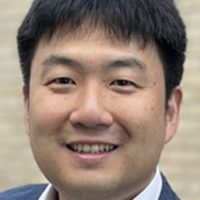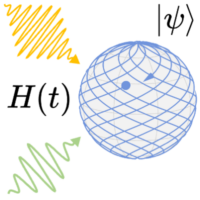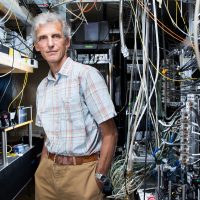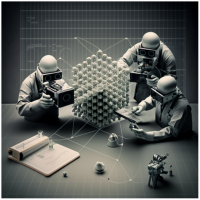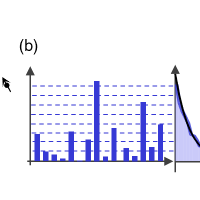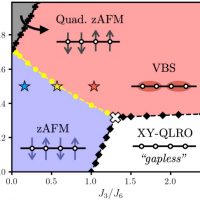- D. Mark, J. Choi, M. Endres, S. Choi, F. Surace, A. Elben, A. Shaw, and G. Refael. A Maximum Entropy Principle in Deep Thermalization and in Hilbert-Space Ergodicity. Phys Rev X, 14(041051), November 2024.
- J. Choi, D. Mark, S. Choi, M. Endres, A. Shaw, Z. Chen, P. Scholl, R. Finkelstein, and A. Elben. Benchmarking highly entangled states on a 60-atom analogue quantum simulator. Nature, 628, 2024.
- D. Mark, H.-Y. Hu, K. Kwon, S. Choi, S. Yelin, and C. Kokail. Efficiently measuring d-wave pairing and beyond in quantum gas microscopes. ArXiv 2024.
- I. Cong, N. Maskara, H. Pichler, G. Semeghini, S. Yelin, S. Choi, and M.C. Tran. Enhancing Detection of Topological Order by Local Error Correction. Nature Communications 2024.
- S. Saul Pilatowsky-Cameo, S. Choi, W.W. Ho, and I. Marvian. Hilbert-Space Ergodicity in Driven Quantum Systems: Obstructions and Designs. Phys Rev X, 14(041059), December 2024.
- X. Gao, M. Kalinowski, M. Lukin, S. Choi, Chi-Ning Chou, and Boaz Barak. Limitations of Linear Cross-Entropy as a Measure for Quantum Advantage. PRX Quantum February 2024.
- S. Saul Pilatowsky-Cameo, W.W. Ho, S. Choi, and C. Dag. Complete Hilbert-Space Ergodicity in Quantum Dynamics of Generalized Fibonacci Drives. Phys Rev Lett, 131(250401), December 2023.
- L. Martin, H. Zhou, N. Leitao, N. Maskara, O. Makarova, H. Gao, Q.-Z. Zhu, H. Park, S. Choi, M. Lukin, M. Park, and M. Tyler. Controlling local thermalization dynamics in a Floquet-engineered dipolar ensemble. Phys Rev Lett, 130(210403), March 2023.
- Z. Li, S. Colombo, C. Shu, G. Velez, S. Choi, M. Lukin, E. Pedrozo-Peñafiel, V. Vuletic, S. Pilatowsky-Cameo, and R. Schmied. Improving metrology with quantum scrambling. Science, 380(6652):1381-1384, June 2023.
- J. Ramette, V. Vuletic, W.W. Ho, S. Choi, J. Y. Lee, and M. A. Metlitski. Landau-Forbidden Quantum Criticality in Rydberg Quantum Simulators. Phys Rev Lett, 131(083601), August 2023.
- K. Rezai, S. Choi, M. Lukin, and A. Sushkov. Probing dynamics of a two-dimensional dipolar spin ensemble using single qubit sensor. ArXiv 2022.
- S. Ebadi, A. Keesling Contreras, M. Cain, T. Wang, H. Levine, D. Bluvstein, G. Semeghini, A. Omran, J. Liu, B. Nash, X. Gao, L. Zhou, S. Choi, H. Pichler, S. Wang, M. Greiner, V. Vuletic, M. Lukin, Rhine Samajdar, Xiu-Zhe Luo, Boaz Barak, Edward Farhi, Subir Sachdev, and Nathan Gemelke. Quantum Optimization of Maximum Independent Set using Rydberg Atom Arrays. Science May 2022.
- M. Kalinowski, M. Lukin, S. Choi, Rhine Samajdar, Roger G. Melko, and Subir Sachdev. Bulk and Boundary Quantum Phase Transitions in a Square Rydberg Atom Array. ArXiv December 2021.
- D. Bluvstein, A. Omran, H. Levine, A. Keesling Contreras, G. Semeghini, S. Ebadi, T. Wang, N. Maskara, W.W. Ho, S. Choi, M. Greiner, V. Vuletic, M. Lukin, A. A. Michailidis, and M. Serbyn. Controlling many-body dynamics with driven quantum scars in Rydberg atom arrays. Science, 371(6536):1355-1359, March 2021.
- N. Maskara, W.W. Ho, D. Bluvstein, S. Choi, M. Lukin, Alexios A. Michailidis, and Maksym Serbyn. Discrete time-crystalline order enabled by quantum many-body scars: entanglement steering via periodic driving. PhysRevLett, 127(090602), August 2021.
- S. Ebadi, T. Wang, H. Levine, A. Keesling Contreras, G. Semeghini, A. Omran, D. Bluvstein, H. Pichler, W.W. Ho, S. Choi, M. Greiner, V. Vuletic, M. Lukin, Rhine Samajdar, and Subir Sachdev. Quantum Phases of Matter on a 256-Atom Programmable Quantum Simulator. Nature, 595:227-232, July 2021.
- L. Zhou, S. Wang, S. Choi, H. Pichler, and M. Lukin. Quantum Approximate Optimization Algorithm: Performance, Mechanism, and Implementation on Near-term Devices. Physics Rev X, 10(021067), June 2020.
- H. Zhou, J. Choi, S. Choi, R. Landig, P. Cappellaro, H. Knowles, H. Park, M. Lukin, A. Douglas, J. Isoya, F. Jelezko, S. Onoda, and H. Sumiya. Quantum Metrology with Strongly Interacting Spin Systems. Phys. Rev. X, 10(031003), 2020.
- J. Choi, H. Zhou, H. Knowles, R. Landig, S. Choi, and M. Lukin. Robust Dynamic Hamiltonian Engineering of Many-Body Spin Systems. Phys. Rev. X, 10(031002), 2020.
- S. Choi, H. Pichler, W.W. Ho, M. Lukin, D. Abanin, J. Turner, A.A. Michailidis, Z. Papic, and M. Serbyn. Emergent SU(2) dynamics and perfect quantum many-body scars. Phys. Rev. Lett., 122(220603), June 2019.
- A. Omran, H. Levine, A. Keesling Contreras, G. Semeghini, S. Ebadi, H. Bernien, A. Zibrov, H. Pichler, S. Choi, M. Endres, M. Greiner, V. Vuletic, M. Lukin, T. T. Wang, J. Cui, M. Rossignolo, P. Rembold, S. Montangero, and T. Calarco. Generation and manipulation of Schrödinger cat states in Rydberg atom arrays. Science, 365(6453):570-574, August 2019.
- W.W. Ho, S. Choi, H. Pichler, and M. Lukin. Periodic Orbits, Entanglement and Quantum Many-body scars in constrained models: Matrix product state approach. Phys. Rev. Lett January 2019.
- A. Lukin, M. Rispoli, R. Schittko, M. Tai, A. Kaufman, S. Choi, J. Leonard, M. Greiner, and V. Khemani. Probing entanglement in a many-body-localized system. Science April 2019.
- J. Choi, H. Zhou, S. Choi, R. Landig, W.W. Ho, D. Abanin, M. Lukin, Junichi Isoya, Fedor Jelezko, Shinobu Onoda, and Hitoshi Sumiya. Probing quantum thermalization of a disordered dipolar spin ensemble with discrete time-crystalline order. Phys. Rev. Lett, 122(043603), February 2019.
- A. Keesling Contreras, A. Omran, H. Levine, H. Bernien, H. Pichler, S. Choi, M. Endres, M. Greiner, V. Vuletic, M. Lukin, R. Samajdar, S. Schwartz, P. Silvi, S. Sachdev, and P. Zoller. Quantum Kibble-Zurek mechanism and critical dynamics on a programmable Rydberg simulator. Nature, 568:207–211, April 2019.
- S. Choi, A. Lukin, M. Tai, M. Rispoli, R. Schittko, P. Preiss, A. Kaufman, M. Greiner, H. Pichler, J. Cotler, H. Gharibyan, T. Grover, and P. Hayden. Quantum virtual cooling. Phys. Rev. X, 9(031013), 2019.
- S. Choi, H. Pichler, M. Lukin, R. Samajdar, and S. Sachdev. Numerical study of the chiral Z3 quantum phase transition in one spatial dimension. Physical Review A, 97(023614), August 2018.
- I. Cong, S. Choi, and M. Lukin. Quantum Convolutional Neural Networks. ArXiv 2018.
- H. Bernien, A. Keesling Contreras, H. Levine, A. Omran, H. Pichler, S. Choi, A. Zibrov, M. Endres, M. Greiner, V. Vuletic, M. Lukin, and S. Schwartz. Probing many-body dynamics on a 51-atom quantum simulator. Nature, 551:579-584, 2017.
- S. Choi, N. Yao, and M. Lukin. Quantum metrology based on strongly correlated matter. ArXiv 2017.
Tue November 26, 2024
Maximum Entropy Principle in Deep Thermalization and in Hilbert-Space Ergodicity
News type:
Wed November 20, 2024
Hilbert-Space Ergodicity in Driven Quantum Systems: Obstructions and Designs
News type:
Fri April 14, 2023
Measuring Arbitrary Physical Properties in Analog Quantum Simulation (Choi Group)
News type:
Mon November 14, 2022
Benchmarking quantum devices based on fingerprints of quantum chaos
News type:
Mon November 14, 2022
Quantum Mechanics Intertwines Symmetries: how to study deconfined quantum criticality using analog quantum simulators
News type:
